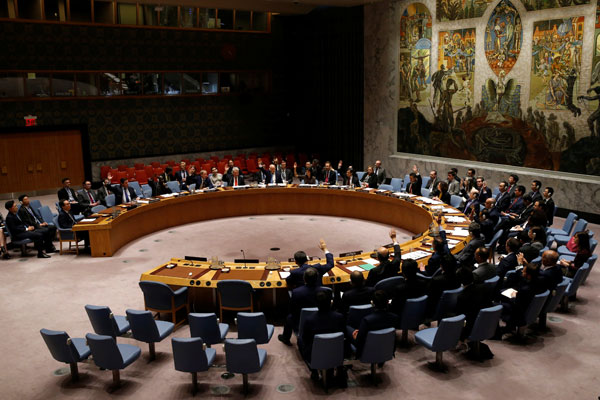Media Report

- Quartz reports: "The question of whether Beijing would go along with much harsher sanctions against North Korea was answered this weekend. China voted in favor of sanctions that promise to cut North Korea's annual export revenue by a third, going along with the other members of the UN Security Council. But now, China argues, it's time for other nations to do their part. A page-one editorial in the overseas edition of the state-run People's Daily argues the US and South Korea should suspend military exercises in the area. And North Korea, for its part, should stop launching missiles and conducting nuclear tests. Then all parties should come to the negotiating table. The 'dual suspension' argument was first floated in March, when foreign minister Wang Yi spoke to reporters in Beijing. But now, significantly, it's appearing on the front page of China's main government-mouthpiece publication. To the administration of US president Donald Trump, who's been blaming Beijing for not doing enough to rein in Pyongyang, it seems to be saying, the ball is in your court."
- The Washington Post comments: "Political attention (in India) has been focused this summer in two very different directions. There is the Himalayan plateau where Indian and Chinese troops are engaged in the most tense and potentially explosive standoff since a 1962 border war. And there is the din emanating from the Trump administration, which has managed to frighten and confound just about every nation that counts on U.S. global engagement. The two problems are not directly related: Indians wouldn't want the United States to get involved in their dispute with Beijing, dangerous though it is, even if a more functional administration were in office. But the confluence is nevertheless unnerving. It has meant that India, a country with which President Trump claims to have established excellent relations, has had to grapple with both a dramatic demonstration of the strategic threat posed by China and an incipient crumbling of confidence in the American partnership it has seen as the antidote... India's strategy for balancing China depends heavily on the United States. Though unwilling to conclude a direct alliance, Modi has followed previous Indian governments in moving steadily closer to Washington, conducting joint naval exercises and buying U.S. military equipment. His was one of the few friendly governments to find some cheer in Trump's election: The candidate, after all, had promised to improve relations with India's friend Russia and get tough on China and terrorism by Muslim extremists."
- Reuters reports: "A U.S.-drafted United Nations Security Council resolution aims to slash by a third North Korea's $3 billion annual export income by banning the country's exports of coal, iron, iron ore, lead, lead ore and seafood, a council diplomat said on Friday. The diplomat, speaking on condition of anonymity, said there was a "high confidence" that Russia and China would support the draft resolution. The United States is aiming for a vote on Saturday to impose the stronger sanctions over North Korea's two intercontinental ballistic missile (ICBM) tests in July, diplomats said. A resolution needs nine votes in favor, and no vetoes by the United States, China, Russia, France or Britain, to be adopted. The draft resolution would also prohibit countries from increasing the current numbers of North Korean laborers working abroad, ban new joint ventures with North Korea and any new investment in current joint ventures."
Calendar
- 2017-08-06 China says sanctions needed for North Korea but talks crucial
- 2017-08-04 With live-fire drill, China warns India not to test Beijing
- 2017-08-03 China welcomes U.S. seeking dialogue with North Korea
- 2017-08-02 Trump Administration Is Said to Open Broad Inquiry Into China’s Trade Practices
- 2017-08-01 China Takes Tough Line on Sovereignty Amid Territorial Spats With Neighbors
- 2017-07-31 Trump plan on China may come as soon as this week
- 2017-07-30 China Shows Off Military Might as Xi Jinping Tries to Cement Power
- 2017-07-28 Value of U.S. deals in China sinks on rising trade tensions
- 2017-07-27 U.S. Pacific Fleet commander: I'd launch nuclear strike against China if Trump ordered it
- 2017-07-26 US and China report progress on new North Korea sanctions
News
- Reuters Draft U.N. resolution would slash North Korea exports by a third: diplomat
- Quartz China says it's done its part to rein in North Korea—now the US and South Korea should step up
- Reuters Australia, Japan, U.S. call for South China Sea code to be legally binding
- LA Times 'China has conquered Kenya': Inside Beijing's new strategy to win African hearts and minds
- Quartz Chinese people have lots of faith in China, but not so much in their fellow Chinese
- Fortune The Trump Brand Has Been Granted Trademarks in Macau, China's Casino Hub
- Newsweek China Considering Military Action Against India
- Bloomberg China's Foreign Reserves Rise for a Sixth Month
- The Wall Street Journal China Gives Up Global Role for a Stronger Yuan
- The New York Times Weaning Itself From Elephant Ivory, China Turns to Mammoths
- CNBC China's found a new way to crack down on a secretive—but common—practice
- CNBC How This U.S. Tech Giant Is Backing China's Tech Ambitions
- NPR China's Few Investigative Journalists Face Increasing Challenges
- The New York Times Trump Company Moves to Protect Brand in Chinese Gambling Hub
Commentary
- The Washington Post India wanted a friend in Trump. Instead, it's getting chaos.
- Bloomberg Inside the Secret World of Global Food Spies
- Forbes China-Like Wages Now Part Of U.S. Employment Boom
- Slate China Warns North Korea Tensions Entering "Critical Phase" After New U.N. Sanctions
- Lawfare Water Wars: China Displays Diplomatic Skill and Military Might
- Slate Chinese Tourists Arrested for Making Nazi Salutes in Berlin
- Bloomberg Has China's Rise Topped Out?
